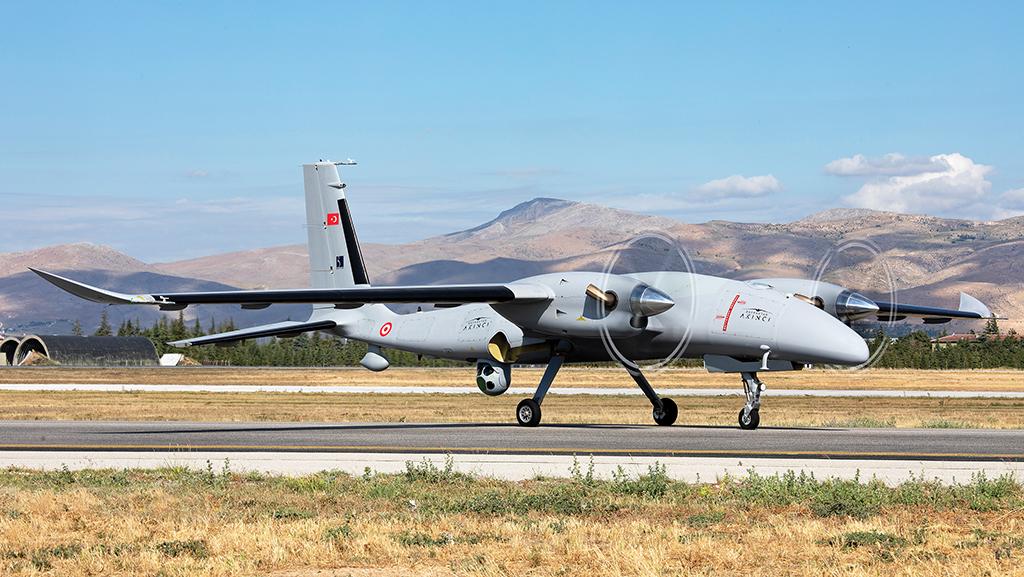
Despite its short service tenure, the Akinci drone has added Saudi Arabia to its growing list of export customers.
Recent disagreements between Saudi Arabia and Turkey appeared to be long forgotten as the two countries signed an estimated $3 billion agreement on Aug. 7, paving the way for Turkey’s Baykar to produce its medium-altitude, long-endurance Akinci platform in Saudi Arabia, while fellow Turkish defense companies Aselsan and Roketsan will localize production of the Akinci’s sensors and weapons.
The arrangements among the three companies and Saudi industry follow agreements made in Jeddah, Saudi Arabia, in July in the presence of Turkish President Recep Tayyip Erdogan and Saudi Crown Prince Mohammed bin Salman.
- Akinci production plans align with Riyadh’s Vision 2030
- Turkish drones could edge out Chinese-made systems
As well as a turning point in diplomatic relations between Ankara and Riyadh, the move also seems to confirm the rapid erosion of China’s once dominant market position in the region, which has been noted elsewhere. Saudi Arabia’s neighbors have also been investing in the Turkish systems, including Kuwait, Qatar and the United Arab Emirates, all of which have purchased the smaller Bayraktar TB2 platform.
Saudi Arabia has been among the biggest buyers of Chinese uncrewed aircraft system (UAS). But the adoption of the Akinci could lead to that platform unseating Chinese medium-altitude, long-endurance systems such as the Chengdu Aircraft Industry Group Wing Loong family of UAS, 60 of which are in service, according to the Aviation Week Intelligence Network’s Military Fleet Discovery database.
Despite initial enthusiasm for Chinese systems, governments in the Middle East have been frustrated by the platforms’ unreliability, suppliers’ lack of maintenance support and their electro-optical systems’ poor fidelity—issues the Turkish platforms have managed to overcome.
Baykar will produce the Akinci with the growing conglomerate Saudi Arabian Military Industries (SAMI), while Aselsan and Roketsan will localize manufacture of their products for the Akinci with the Saudi National Company for Mechanical Systems (NCMS).
The value of the agreement and timelines for first UAS delivery have not been disclosed, and it remains unclear how many Akinci aircraft will be built in Saudi Arabia, but the deal is the “biggest export agreement in the history of the Republic [of Turkey] in defense and aviation,” Baykar’s CEO Haluk Bayraktar said. “A strong and strategic cooperation is taking place between Turkey and Saudi Arabia. Our bond of friendship is getting stronger.”
SAMI officials said the agreement would enhance the company’s role in supporting the national defense industry and strengthening local capabilities. A graphic published by the group suggests that Saudi Arabia wants to achieve a 70% localization rate on the production of the Akinci, with manufacturing of the aircraft’s structure, assembly and flight testing taking place in-country. Saudi industry also wants to perform repairs and maintenance on the aircraft as well as integrate new sensors and payloads.
The agreement with Aselsan is likely to enable the local manufacture of electro-optical turrets and communication systems, while the agreement with Roketsan should enable production of the MAM-L and MAM-C small smart munitions, which have been widely used by other customers operating the Baykar family of UAS.
The efforts align with Salman’s ambition for Saudi Arabia—which has the fifth-largest defense budget in the world—to localize 50% of the country’s military spending with domestic industry by the end of the decade as part of his Vision 2030 effort to decrease the country’s economic dependence on oil.
Haluk Gorgun, president of Turkish defense industry agency SSB, said the new agreements “will add strength and momentum to the defense industry of both countries,” adding: “It is a great gain for our country to be able to contribute to the high technologies of our allies.”
Saudi Arabia’s adoption of Turkish drones comes just five years after the nadir in Turkish-Saudi relations due to differences over influence in other Muslim countries, the Qatari diplomatic crisis and the murder of journalist Jamal Khashoggi in the Saudi embassy in Istanbul.
Saudi Arabia is no stranger to Turkish-developed UAS. Intra Defense Technologies operated several Vestel (now Lentatek) Karayel tactical UAS for the Saudi military that were used over Yemen, and the company aimed to build and update the platform in-country before production plans were shelved.
In addition to the Akinci acquisition, Saudi Arabia likely will continue developing its own platforms to expand UAS capabilities for military and parapublic agencies performing defense and internal security missions.





